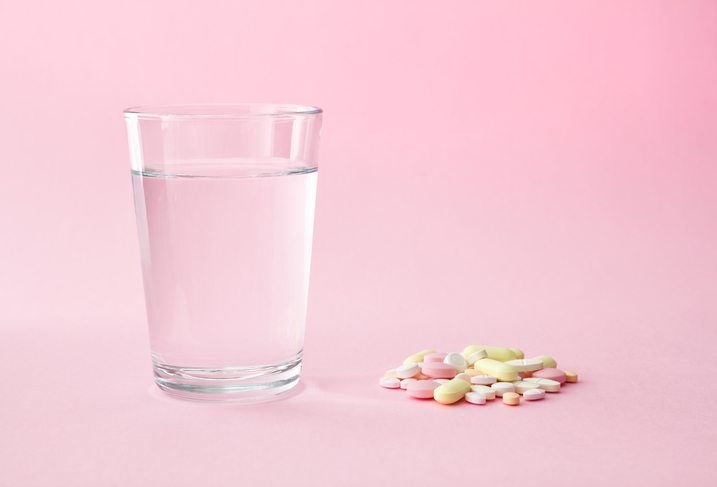From taking too much or not enough, to buying cheap – women like you are making supplement mistakes that could be damaging their health. Anna Magee reports
To take or not to take, that is often the question. Indeed, every day delivers a new – often conflicting -piece of advice about vitamins. Just last month, research from Harvard University found that a pregnant mother taking a multivitamin could add the equivalent of up to a year of schooling to the child’s cognitive abilities. But once you’ve made the decision to take supplements – and many of us have – research in The Grocer published last year found that sales of supplements had overtaken painkillers for the first time since 2005 – it seems you could be making mistakes that could impact their effectiveness.
So who might need a supplement?
‘Food should always come first and supplements are only really there to bridge any gaps in your diet,’ says nutritionist Robert Hobson. Examples of when you might need to invest in a supplement include:
If you’re not eating five a day, you might need a multi-vitamin and mineral
If you don’t eat oily fish, you might need an omega 3 supplement
If you’re vegan, you probably need calcium, vitamin D, omega 3 and B12
If you’re pregnant, you might need folic acid and vitamin D
Supplement mistake #1: DOUBLE DOSING

Recent reports about the dangers of overdosing on gummy vitamins have highlighted the very real danger of too much of a good thing (or in the case of gummy vitamins, a not-so-good thing loaded with sugar). So what are the dangers?
‘There’s no benefit to taking mega doses of supplements as their benefits don’t increase exponentially,’ says Robert Hobson, a nutritionist for Healthspan. Too much magnesium, zinc or vitamin C can cause nausea and stomach upset while o’ding on iron can cause a pretty serious bout of constipation. At worst, too much magnesium can cause heart arrhythmia, an overdose of B vitamins can lead to nerve damage and that innocuous calcium tablet? Too many could even lead you with kidney stones, asserts Hobson.
too much magnesium can cause heart arrhythmia, an overdose of B vitamins can lead to nerve damage
‘Check the back of supplements, especially if you’re taking separate vitamins and minerals. Some have a Recommended Daily Intake (RDA – that’s the amount the government says we need) close to the Tolerable Upper Intake Limit (TUIL – the upper limit amount the government says is safe to take) so I wouldn’t recommend taking supplements such as iron or magnesium separately alongside a multivitamin and mineral that contains 100 per cent of the RDA,’ says Hobson. The RDA for iron is 14mg while the TUIL is 17mg and then RDA for magnesium is 300mg and the TUIL is 400mg.
Supplement mistake #2: TAKING THE WRONG COMBINATION

If you’re taking a multivitamin and mineral, then choose one that is prepared for your age. The RDAs are different for certain nutrients as our needs differ as we get older. Moreover, your age can impact on how effective the body is at absorbing nutrients and then utilizing them from the gut.
‘If you’re 50+ for example, a multivitamin or mineral formula will typically provide 150-200 per cent of the RDA for certain nutrients, especially B vitamins,’ says Dr Sarah Brewer, a GP with a special interest in natural health. ‘As you get older your ability to absorb and use these nutrients from the intestines is decreased. You might also benefit from the anti-ageing potential of some antioxidants added to the mix such as gingko biloba which improves blood flow to the brain.’ Plus, she explains your need for iron is increase as women will probably not be menstruating anymore.’ Healthspan’s Multivitality 50+ (£11.95 for 180 tablets) is specifically aimed at this age group.
taking calcium or zinc with iron can reduce the absorption of iron
‘Some combinations of vitamins work in synergy such as iron and vitamin C, which helps increase absorption,’ says Robert Hobson. ‘But other supplements can have the opposite effect. For example, taking calcium or zinc with iron can reduce the absorption of iron, which is particularly relevant if you’re trying to combat anaemia’.
You should be aware of any risks involved in taking certain supplements so check with your doctor for more advice. For example, soy isoflavones are often taken as a lone supplement or in preparations tailored for the menopause as they have been shown to help reduce hot flushes, Hobson explains. ‘But high intakes of soy are not recommended for women that have or have had oestrogen-receptor-positive breast cancer’.
omega 3 supplements can thin the blood and therefore interfere with blood pressure mediations
The same goes for any other medication you may be taking and the possible interactions with supplements. If you have high blood pressure and are taking medication you may think it is a good idea to take omega 3 supplements to help protect your heart but this may interfere with your medication as omega 3 can thin the blood. If you are on any medication, check with your doctor before taking supplements.
Supplement mistake #3: TAKING THE WRONG PROBIOTIC
Taking probiotics has in recent months been associated with everything from reducing obesity to mind health and infection prevention. ’70 per cent of your immune system is located in the gut so maintaining good bacteria levels is beneficial,’ asserts Robert Hobson. ‘Research suggests taking probiotics can reduce the incidence and duration of illness of upper respiratory tract infections such as colds and coughs and can also help with symptoms of Irritable Bowel Syndrome (IBS) including cramping, diarrhea, bloating and constipation.

Multivitamins with probiotics are growing in popularity as they combine essential micronutrients with ‘friendly’ digestive bacteria for optimum intestinal health, says Dr Brewer. ‘Early formulations provided low doses of one or two strains, but newer products are tending towards providing a higher number of a wider range of probiotic bacteria per dose for greater health benefits,’ she explains.
You should look for 10 billion bacteria per dose to be effective enough to reach the gut
‘Early supplements tended to focus on uncharacterised strains of Lactobacillus acidophilus or L. plantarum or Bifidobacterium lactis for general digestive health,’ Dr Brewer continues. ‘But strains are now highly characterised so you are more likely to see L. acidophilus La-14, L. plantarum Lp-115 or B. lactis HB019 or B.lactis Bl-04 on labels. These strains are highly researched for safety, survival through stomach acid and for their ability to thrive and colonise within the large bowel.’ In general, the greater the variety of probiotic strains you’re taking, the better for your gut’s flora and the greater the impact will be on your health..
‘You should look for 10 billion bacteria per dose to be effective enough to reach the gut’, adds Robert Hobson. Check labels as many probiotics provide far fewer than this. Try Healthspan’s Superpro50 £23.95.
Supplement mistake #4: BUYING CHEAP

A basic, no frills formula will usually provide the most important vitamins (A, B group, C, D3, E, biotin, folic acid) plus key minerals such as calcium, copper, iodine, manganese and zinc, usually at around 100 per cent of the RDA, explains Dr Brewer. ‘But if your diet is not as good as it could be, you may benefit from a more complete A to Z formula which includes a wider range of micronutrients, such as vitamin K, magnesium, selenium plus additional trace elements such as boron, chromium and molybdenum.’ A cheap supplement may not supply these extras. These are important because they are often missing from a highly processed diet, as they are stripped out with the bran when producing white grain products, for example (so especially pertinent if you eat a lot of processed carbs). You could also be lacking if you are skipping meals, cutting back on food to lose weight, avoiding certain food groups such as carbs or meat or exercising and sweating a lot which can further increase nutrient losses.
MORE: best supplements for tired people
Supplement mistake #5: NOT LOOKING FOR THE ‘GMP’ MARK ON A LABEL
Cheap products are unlikely to have been produced to Good Manufacturing Practice (GMP) standards so no there will be no consistency of dose, and no guarantee they actually contain what they say on the label, says Dr Brewer.
GMP refers to the rules and regulations that ensure the consistent quality of medical drugs. These pharmaceutical guidelines can also be applied to the manufacture of food supplements, to ensure that each tablet or capsule contains the right ingredients, in the amounts specified, with no contaminants, Dr Brewer explains. ‘Not all manufacturers do this because of the extra cost and effort involved, but it is important to ensure you obtain the same benefit from each dose. A multivitamin that is not made to GMP standards for example could have, twice as much selenium in one tablet, and hardly any in another, compared with the amount claimed on the label.
A multivitamin that is not made to GMP standards for example could have, twice as much selenium in one tablet, and hardly any in another
‘If you value the quality of the supplements on which you spend your hard-earned cash, check the manufacturer’s website to see if they have a GMP statement. The easiest way to do this is to Google the manufacturer’s name plus the term (eg ‘Healthspan Good Manufacturing Practice’) – if you can’t find anything, chances are it’s not produced to that standard,’ Dr Brewer advises.
Supplement mistake #6: TAKING THEM AT THE WRONG TIME

‘Just remember to take them!’ says Dr Brewer. ‘It’s easier to remember if you get into a routine and take them at the same time each day. Keep them by your toothbrush, for example, or by your keyboard (as long as they are out of the reach of young children). Setting a reminder on your watch, mobile phone or computer is a good strategy, too’.
Don’t wash supplements down with coffee or tea, as this can interfere with absorption of some minerals.
Most supplements are best taken immediately after food and washed down with water or orange juice for maximum absorption – check label instructions, advises Dr Brewer. ‘If you have not eaten for more than 30 minutes, wait until you have a snack – just four bites of food or a glass of juice will do. Don’t wash supplements down with coffee or tea, as this can interfere with absorption of some minerals.
‘If taking two or more capsules of the same preparation a day, you can either take them together or spread them out (eg morning and evening) if that suits you better,’ she concludes.
Robert Hobson has compiled a list of examples of the best time to take ket supplements:
Probiotics are best taken in the morning at breakfast as this has been shown to be the time when bacteria have the greatest chances of survival through the acidic conditions of the gut. Avoid taking with hot drinks as this will destroy the bacteria.
Vitamin C doesn’t last long in the bloodstream so try taking in split doses across the day.
B vitamins help to covert food into energy so take in the morning so they can take action from the first meal you eat.
Zinc should be taken with a meal as it can make you feel nauseas so if you happen to skip breakfast then take at lunchtime.
Calcium is best taken at night as this is when it is best utilised by the body.
MORE: 10 best supplements for vegans
Like this article? Sign up to our newsletter to get more articles like this delivered straight to your inbox.





















































